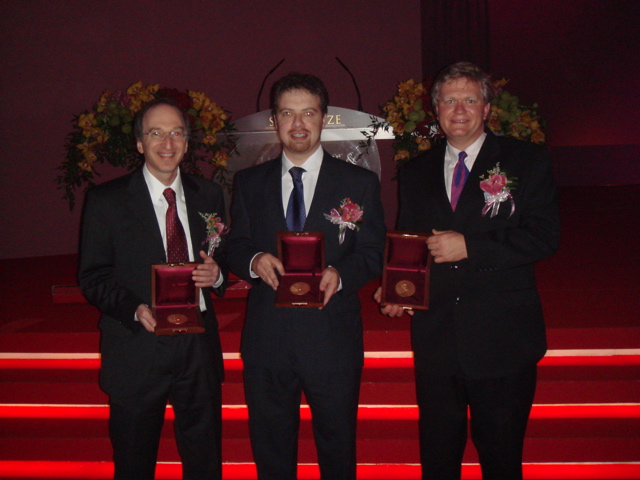Shaw Prize on:
[Wikipedia]
[Google]
[Amazon]
 The Shaw Prize is an annual award presented by the Shaw Prize Foundation. Established in 2002 in
The Shaw Prize is an annual award presented by the Shaw Prize Foundation. Established in 2002 in
File:Richard Doll.jpg, Richard Doll, one of the 2004 winners of the Shaw Prize in Life Science and Medicine
File:Shiing-Shen Chern.jpg, Shiing-Shen Chern, the 2004 winner of the Shaw Prize in Mathematical Sciences
File:Andrew wiles1-3.jpg, Andrew Wiles, the 2005 winner of the Shaw Prize in Mathematical Sciences
File:Vladimir Arnold-1.jpg, Vladimir Arnold, one of the 2008 winners of the Shaw Prize in Mathematical Sciences
 The Shaw Prize is an annual award presented by the Shaw Prize Foundation. Established in 2002 in
The Shaw Prize is an annual award presented by the Shaw Prize Foundation. Established in 2002 in Hong Kong
Hong Kong ( (US) or (UK); , ), officially the Hong Kong Special Administrative Region of the People's Republic of China (abbr. Hong Kong SAR or HKSAR), is a city and special administrative region of China on the eastern Pearl River Delta i ...
, it honours "individuals who are currently active in their respective fields and who have recently achieved distinguished and significant advances, who have made outstanding contributions in academic and scientific research or applications, or who in other domains have achieved excellence. The award is dedicated to furthering societal progress, enhancing quality of life, and enriching humanity's spiritual civilization."The prize has been described as the "Nobel of the East". It was founded by Hong Kong entertainment mogul and philanthropist Run Run Shaw (邵逸夫).
Award
The prize consists of three awards in the fields ofastronomy
Astronomy () is a natural science that studies astronomical object, celestial objects and phenomena. It uses mathematics, physics, and chemistry in order to explain their origin and chronology of the Universe, evolution. Objects of interest ...
, life science and medicine
Medicine is the science and Praxis (process), practice of caring for a patient, managing the diagnosis, prognosis, Preventive medicine, prevention, therapy, treatment, Palliative care, palliation of their injury or disease, and Health promotion ...
, and mathematical sciences; it is not awarded posthumously. Nominations are submitted by invited individuals beginning each year in September. Winners are announced in the summer and receive the award at a ceremony in early autumn. Each award consists of a gold medal, a certificate and USD$1.2 million (USD$1 million before 2015). The front of the medal bears a portrait of Shaw and the name of the prize in English and Traditional Chinese characters
Traditional Chinese characters are one type of standard Chinese characters, Chinese character sets of the contemporary written Chinese. The traditional characters had taken shapes since the libian, clerical change and mostly remained in the ...
; the back bears the year, category, laureate's name and a quotation from the Chinese philosopher Xunzi "制天命而用之" (translated to English as "Grasp the law of nature and make use of it").
As of 2022, there have been 99 Shaw Laureates. 16 Nobel laureates - Jules A. Hoffmann, Bruce Beutler
Bruce Alan Beutler ( ; born December 29, 1957) is an American immunologist and geneticist. Together with Jules A. Hoffmann, he received one-half of the 2011 Nobel Prize in Physiology or Medicine, for "their discoveries concerning the activatio ...
, Saul Perlmutter, Adam Riess, Shinya Yamanaka, Robert Lefkowitz , Brian Schmidt, Jeffrey C. Hall, Michael Rosbash, Michael W. Young
Michael Warren Young (born March 28, 1949) is an American biologist and geneticist. He has dedicated over three decades to research studying genetically controlled patterns of sleep and wakefulness within ''Drosophila melanogaster''.
At Rock ...
, Kip Thorne, Rainer Weiss, Jim Peebles, Michel Mayor, Reinhard Genzel, and David Julius - are Shaw Laureates. The inaugural laureate of the Shaw Prize in Astronomy was Jim Peebles, honored for his contributions to cosmology
Cosmology () is a branch of physics and metaphysics dealing with the nature of the universe. The term ''cosmology'' was first used in English in 1656 in Thomas Blount's ''Glossographia'', and in 1731 taken up in Latin by German philosophe ...
. Two inaugural prizes were awarded for the Shaw Prize in Life Science and Medicine: Stanley Norman Cohen, Herbert Boyer and Yuet Wai Kan jointly won one of them for their research in DNA while physiologist Richard Doll won the other for his contribution to cancer epidemiology. Shiing-Shen Chern was awarded the inaugural Shaw Prize in Mathematical Sciences for his work on differential geometry.
Shaw Laureates
Astronomy
Life science and medicine
Mathematical sciences
Notes
* The form and spelling of the names according to the Shaw Prize Foundation. * Sites of the work places of the Laureates at the time of the award. * The rationale from the Shaw Prize Foundation. * Two prizes were awarded for the life science and medicine category in 2004:Stanley N. Cohen
Stanley Norman Cohen (born February 17, 1935) is an American geneticist and the Kwoh-Ting Li Professor in the Stanford University School of Medicine. Stanley Cohen and Herbert Boyer were the first scientists to transplant genes from one livin ...
, Herbert W. Boyer and Yuet-Wai Kan jointly received one of the prizes (half went to Cohen and Boyer; the other half went to Kan). Richard Doll received the other prize.
* Half of the 2008 life science and medicine prize went to Keith H. S. Campbell and Ian Wilmut; the other half went to Shinya Yamanaka.
See also
* List of general science and technology awards * List of astronomy awards * List of mathematics awards * List of medicine awards * List of physics awardsReferences
{{featured list Academic awards Mathematics awards Medicine awards Physics awards Astronomy prizes Science and technology awards Awards established in 2002 International awards Hong Kong awards 2002 establishments in Hong Kong